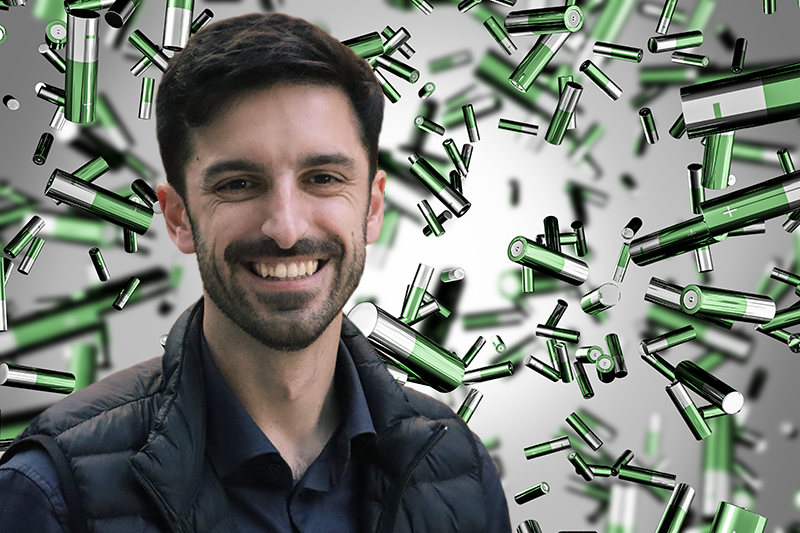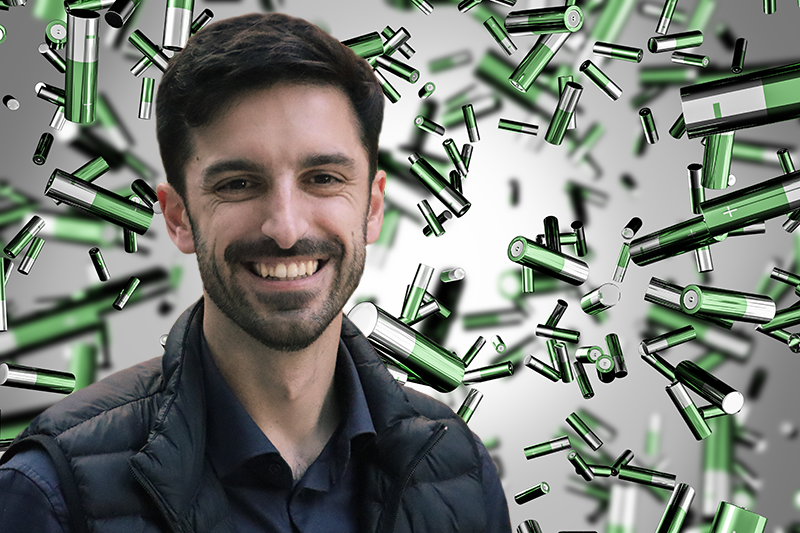Electrochemists Wanted for Vocational Degrees
This article is part of a series of pieces on advances in sustainable battery technologies that Physics Magazine is publishing to celebrate Earth Week 2024. See also: Research News: Lithium-Ion “Traffic Jam” Behind Reduced Battery Performance; Q&A: The Path to Making Batteries Green; News Feature: Sodium as a Green Substitute for Lithium in Batteries; Research News: A New Cathode for Rechargeable Magnesium Batteries.
Electric cars are growing in popularity, a trend that is increasing interest in so-called green batteries—fully recyclable batteries that have been designed and manufactured using sustainable materials and sustainable processes. Start-ups and established companies are betting big on green-battery technologies, which, because of their specialized nature, require a skilled workforce trained in electrochemistry and materials science. Often, people seeking a career in electrochemistry must complete a five-year PhD, says Paul Kempler, an electrochemist at the University of Oregon. Kempler is the director of a master’s program that gets students up to speed in as little as 15 months, while also giving them on-the-job vocational training. Physics Magazine spoke to Kempler about the program and about why he thinks this kind of training route is the way forward for myriad technology-relevant areas of science, including quantum physics and green-energy-related disciplines.
All interviews are edited for brevity and clarity.
Vocational training courses are rarely offered by physics or chemistry departments at traditional universities. Why do you think offering that kind of instruction is important?
If scientists genuinely want to train a workforce, then we need to go beyond teaching science for the sake of teaching science. The skills and knowledge a person needs to go and work in a battery start-up, for example, aren’t necessarily the same as those they need to be an academic. Of course, it’s still essential that universities offer degrees in fundamental physics and chemistry. But I think we are doing a disservice to students if we don’t also prepare them for life after university. And I’m not sure that we are doing the best we can on that front right now—we train PhD students as if they will all be academics even though we know that most of them will end up following other career paths.
Do you have an example of how a learning path is different in your course compared to a more traditional course?
Our training is tailored specifically to the interests of the student. For example, when we have a student who wants to work with fuel cells, we start by teaching them how to measure the activity of a thin film of catalyst particles. Next, we teach them how to build a fuel cell from scratch, one small enough to fit in the palm of your hand. Then we help the student get a job in a company that develops fuel-cell stacks. The science behind how the fuel cell works is just one component of the training, whereas it might be the only focus of a more traditional course.
Vocational training is all about connecting the dots. The green-battery industry is not only hiring people to sit and think about electrochemistry, it also wants people who can assemble and operate battery packs of all sizes and who understand all the bits and pieces that go into making a cell work. Those people need to be able to fix cells when they break or optimize them to improve performance.
What does the electrochemistry course at the University of Oregon involve?
It’s an intense course. The students take classes for six to nine months, and during that period they don’t have time for anything else. Then they take six-month internships, which are fully paid. The students finish the course debt free and with a complete and realistic picture of what a job in industry entails and what a PhD and career in academia might look like. About 10% of the students so far have transitioned to a PhD after their master’s degrees—and that’s great. But either way, we are very honest and upfront with the students about their career options when they start on the course.
Many institutions advertise science-based master’s programs. How is this one different?
When putting together a graduate-level program in a topic, universities tend to pick out a few relevant courses from the list that they offer to PhD students who need to get a grounding in some aspect of that topic. We took the opposite route. Shannon Boettcher, the founder of the program, sat down with a blank piece of paper and put together a syllabus that would teach someone everything they would need to know for an industry-based career in electrochemistry. We also have industrial partners who we regularly check in with to find out what they want a job candidate to know, and then we update the content of the classes accordingly.
Technology in this area is constantly and quickly evolving. We need to stay nimble—an adjective rarely associated with academia—if we want to give our students the best possible start.
So, is the electrochemistry PhD dead?
No. Vocational courses such as the electrochemistry one at Oregon won’t replace PhDs—the two paths are complementary. Industry-focused learning pathways exist in other countries but are largely absent in the US, and undergraduate courses often miss the specific technical knowledge someone might need to transition to an industry job. In many fields, there is a huge need for scientists with specialized knowledge and training who, when they start a job, can hit the ground running. Battery technology is one of those fields. And the need is only going to get bigger as the world transitions from fossil fuels to renewable energies.
–Katherine Wright
Katherine Wright is the Deputy Editor of Physics Magazine.





